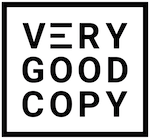
A surprised Reader is a completely engaged Reader.
This complete absorption is due to an involuntary sequence our brains go through when we’re surprised by something, anything, like a headline.

Never miss a VeryGoodCopy Micro-Article: SUBSCRIBE
“Surprise is a strong neuro alert that tells us something is important about this moment and we have to pay attention,” explains Tania Luna, who co-authored a book about how our brains process astonishment. “Our cognitive resources are basically hijacked and pulled into the moment.”
So surprising headlines captivate The Reader, making it more likely she’ll read the next sentence.
Here’s an example from a 1974 newspaper ad:
HOW TO MAKE MONEY WITH YOUR CREDIT CARDSIt was written by famed copywriter Gary Halbert. He wrote it for an ad selling a book called How to Turn Plastic Into Gold.
And to set up the offer, Halbert grabs The Reader with a tried-and-true, simple technique, something you can reliably use to create surprise, curiosity, and engagement:
He presented a paradox, a statement appearing to contradict itself.
“How To Make Money With Your Credit Cards” is outwardly contradictory: credit cards help you spend money, not make money.
So it begs the question: how?
And this question compels folks to read the next sentence, which is the goal of every headline ever written.

LEARN TO PERSUADE
✅ Join thousands of email subscribers
✅ Less than 0.4% of readers unsubscribe
✅ Never miss a Micro-Article or -Interview
✅ Get instant email access to VGC's founder
✅ Be first in line to get new, free Micro-Courses
Hey there, thanks for reading. :)If you want more “micro” content, feel free to explore 100s of articles, interviews, courses, and series — all free. Enjoy!Eddie Shleyner
VeryGoodCopy, founderP.S. If you like VGC, you’ll love VGC Plus. Instantly unlock every post right here.
DRAYTON BIRD
Global Creative Director @ Ogilvy & Mather
BEN SETTLE
Email Marketing Master
KIM KRAUSE SCHWALM
A-List Direct Response Copywriter
RYAN BONNICI
Forbes 26th Most Influential CMO
SCOTT DIKKERS
Founding Editor @ The Onion 🧅
LISA PIERSON
Partner @ CopyHackers Agency
JUSTIN WELSH
SaaS Advisor & Writer
GODARD ABEL
CEO @ G2.com
DAVID GARFINKEL
A-List Direct Response Copywriter
JORGE SELVA
Director of Growth @ Help Scout
ADAM GOYETTE
Chief Marketing Officer @ Help Scout
TYLER J. KOENIG
Conversion Copywriter
TOMMY WALKER
Editor-in-Chief @ Shopify Plus & CXL
JASON VANA
Founder @ SHFT Marketing
JUSTIN BLACKMAN
Founder @ Pretty Fly Copy
CAMILLE TRENT
Managing Editor @ MarketerHire
NIKHIL NARAYANAN
Creative Director @ Ogilvy & Mather
EDEN BIDANI
Copywriter @ Greenlight Copy
MARK KILENS
VP of Content @ Drift































